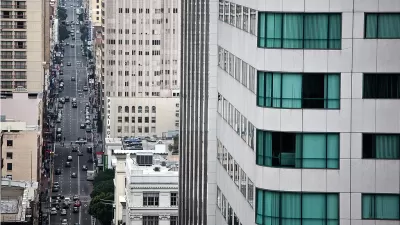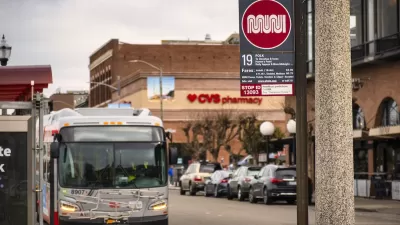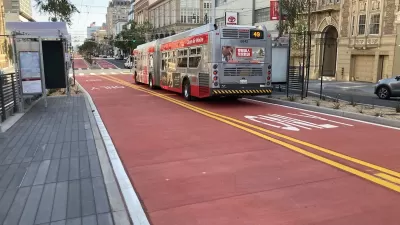Facing record-level population growth and a booming job market, the city of San Francisco wants luxury developers to pay into the public transit system.

San Francisco faces a dilemma. In recent decades, population growth has far outpaced residential housing construction, creating a housing shortage for both affordable and market-rate units. The booming job market has added to the influx of commuters, overburdening an aging public transit system. The city wants to continue its program of encouraging new housing construction, but it also must find a way to mitigate the impact that growing congestion has on the transit system. Until now, downtown luxury high-rises have benefited from a multi-modal location without paying for it. "A luxury tower could advertise transit access as a perk, then dump all these new residents onto a bus and rail system that was already overloaded," writes Eric Jaffe.
To address the growing gap between population and transit capacity, the city has proposed that existing transit impact development fees be extended to market-rate residential developers. The fee proposal is part of a broader Transportation Sustainability campaign by the Planning Department: "If we don’t change our development practices and invest in transportation improvements citywide, we can expect unprecedented gridlock on our streets and crowding on our buses and trains."
But how much the fee should be is up for debate. Given the need to incentivize new construction, provide more affordable housing, and maintain a robust and reliable transit system, is the proposed fee structure effective? "The fee was set by determining how much development impacts transit in terms of cost, roughly $31 per square foot, then balancing it with the results of a fiscal feasibility study that looked at what level a fee would discourage development," writes Cory Weinberg.
Currently, such fees are paid by commercial builders, and annual revenue streams average $24 million. The new fee structure would increase that amount by 40 percent. According to Weinberg: non-residential developers would see an increase from $14 a square foot to $18.04 a square foot; the manufacturing sector (also a growth target for the city) would see only a minor fee increase, from $7.46 to $7.61 a square foot; and the newly added market-rate residential fee would be $7.74 a square foot.
A previous attempt to impose a transit impact fee on residential development was shot down because it also targeted non-profits, medical centers and affordable housing units. The new proposal exempts these groups as well as builders with less than 20 housing units.
The fact that developers are on board with the new proposal suggests that it will still be very profitable to build luxury condos in San Francisco. "Developer acceptance is great for the plan, but it does raise the question of whether the 'not unreasonable' fee might, in fact, be a bit too reasonable," says Jaffe.
FULL STORY: San Francisco's Humble Request to Luxury Developers: Pitch in for Public Transit

Maui's Vacation Rental Debate Turns Ugly
Verbal attacks, misinformation campaigns and fistfights plague a high-stakes debate to convert thousands of vacation rentals into long-term housing.

Planetizen Federal Action Tracker
A weekly monitor of how Trump’s orders and actions are impacting planners and planning in America.

San Francisco Suspends Traffic Calming Amidst Record Deaths
Citing “a challenging fiscal landscape,” the city will cease the program on the heels of 42 traffic deaths, including 24 pedestrians.

Defunct Pittsburgh Power Plant to Become Residential Tower
A decommissioned steam heat plant will be redeveloped into almost 100 affordable housing units.

Trump Prompts Restructuring of Transportation Research Board in “Unprecedented Overreach”
The TRB has eliminated more than half of its committees including those focused on climate, equity, and cities.

Amtrak Rolls Out New Orleans to Alabama “Mardi Gras” Train
The new service will operate morning and evening departures between Mobile and New Orleans.
Urban Design for Planners 1: Software Tools
This six-course series explores essential urban design concepts using open source software and equips planners with the tools they need to participate fully in the urban design process.
Planning for Universal Design
Learn the tools for implementing Universal Design in planning regulations.
Heyer Gruel & Associates PA
JM Goldson LLC
Custer County Colorado
City of Camden Redevelopment Agency
City of Astoria
Transportation Research & Education Center (TREC) at Portland State University
Jefferson Parish Government
Camden Redevelopment Agency
City of Claremont





























